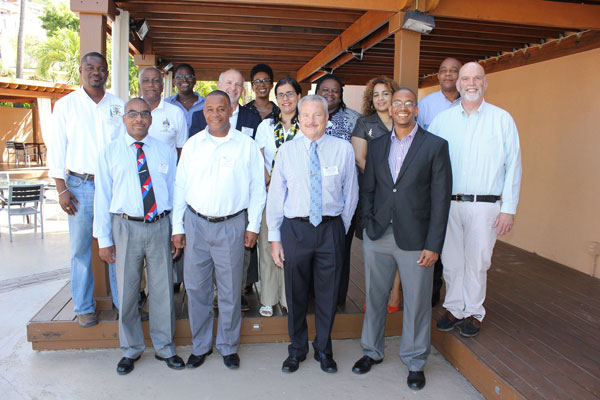 GREAT BAY(DCOMM):--- Sint Maarten was recently the host of the first Communications Technical Working Group (TWG) meeting of the Caribbean Plant Health Directors (CPHD) Forum. The meeting took place at Divi Little Bay from April 14-15.
GREAT BAY(DCOMM):--- Sint Maarten was recently the host of the first Communications Technical Working Group (TWG) meeting of the Caribbean Plant Health Directors (CPHD) Forum. The meeting took place at Divi Little Bay from April 14-15.
This Forum with representatives from 34 countries and territories from across the Region and the Americas, has as its objective the curtailing of the spread of plant pests and diseases since agriculture if one of the basic economic pillars in the Americas and many products from across the Caribbean are traded worldwide.
St. Maarten was represented at this Forum by Mervyn Butcher of the Section responsible for Agriculture, Animal Husbandry and Fisheries from the Inspectorate at the Ministry of Tourism, Economic Affairs, Traffic and Telecommunications. Country Sint Maarten according to Butcher is represented on two of six technical work groups, namely Palm Pest and the Communications. The other four Technical Working Groups are Safeguarding, Fruit Fly, Emergency Preparedness, and Mollucs.
The Communications TWG has drafted a strategy which will be submitted at the next general meeting planned for July in Trinidad & Tobago.
The genesis of the CPHD Forum was largely the result of efforts by the United States Department of Agriculture Animal and Plant Heath and Inspection Services (USDA / APHIS) and CARICOM, with support from the Inter-American Institute for Cooperation on Agriculture (IICA) and the Food and Agriculture Organisation (FAO).
A critical goal of the CPHD Forum is to increase communication and the transparent exchange of sanitary information among Caribbean Countries. One of the means of promoting this exchange is through individual and group interchange of information via the annual CPHD Forum Meeting as the Region does not have a regional sanitary organisation as do all other sub-regions of the Americas (e.g. OIRSA-Central America/Mexico/DR, CAN, COSAVE).
Since there has been liberalization in the trade of plants and plant products, and an obligation on all countries to provide sound scientific data to support the application of any plant health measure(s) and regulatory measures to safeguard their agriculture, this mechanism was put in place.
Countries and territories, in the Caribbean Region face immense challenges in fulfilling this obligation for a number of reasons such as; lack of financial and human resources, technical competence and capacity, infrastructure, and baseline data.
Further compounding the challenges is the reality that the Caribbean Region is one of the few regions that does not have a functioning regional plant protection organization.
A functioning regional plant protection organization provides a platform to address regulatory and technical issues relative to invasive species in areas such as pest detection, mitigation and exclusion, as well as ensure an active voice and representation in the World Trade Organization (WTO/SPS) and other international forums such as IPPC.












